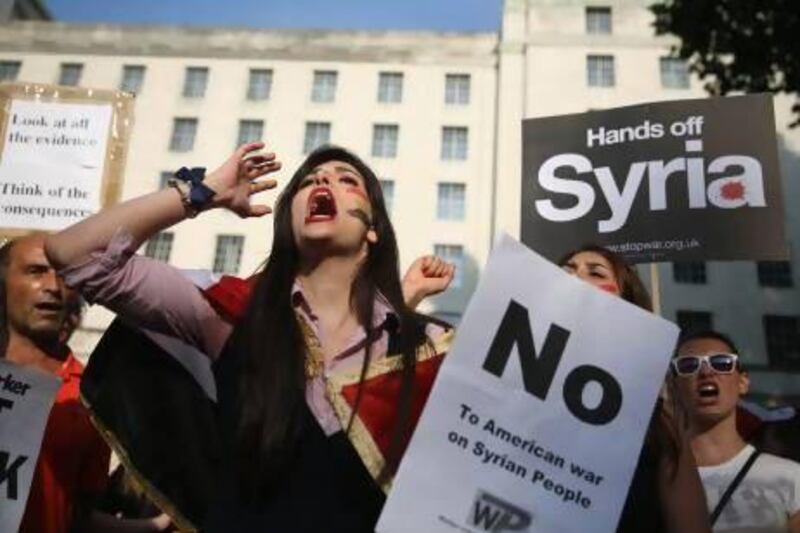NEW YORK // President Bashar Al Assad's Syrian regime was accused yesterday of carrying out at least 14 chemical weapons attacks on rebels since last year as Britain published its legal grounds for mounting military strikes.
The allegation was made as the UK set out its case for the use of force, on the basis of "humanitarian intervention", even if Russia and China use their vetoes to block UN endorsement.
The claims came after President Barack Obama said on Wednesday he is certain the Syrian military carried out the attack, but added that he had not decided how to respond.
Faltering diplomacy with European and regional allies as well as an unclear intelligence picture about who was directly responsible for the chemical weapons attack suggested military intervention could be delayed.
The UK's prime minister, David Cameron, offered key concessions to opposition sceptics by promising to put off any "direct British involvement" in military action until UN weapons inspectors in Syria had reported and his own parliament had been given a chance to consider their findings.
Ban Ki-moon, the UN secretary general, said the team would leave Syria by tomorrow and report to him immediately about the chemical attacks near Damascus that killed hundreds of people.
Unease about the proposed strikes was growing in Europe last night. Mr Cameron's coalition government, which has joined France in spearheading the European lobby for action in Syria, insisted western allies have a right and duty to intervene. But in a UK parliamentary debate Mr Cameron admitted it would be difficult to launch attacks in the face of overwhelming UN opposition.
Mr Al Assad warned yesterday that Syria would defend itself "in the face of any aggression". Threats, he declared, would only increase his country's "commitment to its principles and its independence".
London and Paris believe the Assad regime will carry out further chemical attacks if there is not a limited but punitive military response to the reported slaughter of hundreds near Damascus last week.
Britain's Joint Intelligence committee (JIC) presented what it hoped would be seen as compelling evidence that Syria has cynically and repeatedly flouted international conventions in resorting to chemical warfare against the rebels.
The conclusions, published by Mr Cameron's Downing Street office, said the assessment was made "with the highest possible level of certainty" following an exhaustive inquiry using classified reports, diplomatic evidence and open sources.
"We think that there have been other attacks although we do not have the same degree of confidence in the evidence" the report said. "A clear pattern of regime use has therefore been established."
The JIC's three-page report dismissed regime claims that the reported attacks were faked or the work of opposition fighters.
It said there was "limited but growing" intelligence to support to judgement that the regime did carry out chemical attacks "to help clear the opposition from strategic parts of Damascus".
Despite his concessions on timing, Mr Cameron was scathing about an opposition Labour amendment to his government's own parliamentary motion. This failed to blame the regime for last week's attack, an omission the prime minister described as at odds with the view of Nato, the Arab League, President Obama and "a host of countries around the world".
In the US, a classified report by the Office of the Director of National Intelligence detailing the evidence the US intelligence community has been able to compile on the alleged use of chemical weapons concluded that forces associated with Mr Al Assad likely carried out the attack. But the report also outlined significant remaining questions in the overall intelligence picture, according to intelligence sources interviewed by Associated Press news agency.
Multiple US officials speaking on the condition of anonymity said the intelligence picture contained in the report was "not a slam dunk".
There was uncertainty over who actually controls parts of Syria's chemical weapons arsenal and if Mr Al Assad himself or someone in his inner circle directly ordered the attack. A telephone call between panicked Syrian military officials after the attack occurred that was intercepted by Israeli or US intelligence was between low-level staff, the officials said.
The US has also not been able to determine the exact locations of Syria's chemical weapons depots, which could have been moved over the past week as the US administration ramped up its calls for action, the intelligence officials said. This has raised fears that potential cruise missile strikes aimed at Syrian military installations could accidentally set off the weapons.
The US administration did signal that it was prepared to take unilateral action even without the support of the UN or wavering allies like Britain. US Defence Department officials told NBC News yesterday that the strikes are likely "within days" and that Washington is "past the point of no return" on the issue of military action.
"We ultimately, of course, hold President Assad responsible for the use of chemical weapons by his regime against his own people, regardless of where the command and control lies," State Department spokeswoman Marie Harf said.
US officials have said that they planned to make public the administration's evidence against Damascus in a bid to gain popular support for any limited military intervention, but so far they have not.
Mr Obama has so far also failed to convince Congress that any military intervention in Syria, even limited strikes, is in the national interest.
foreign.desk@thenational.ae
twitter: For breaking news from the Gulf, the Middle East and around the globe follow The National World. Follow us






